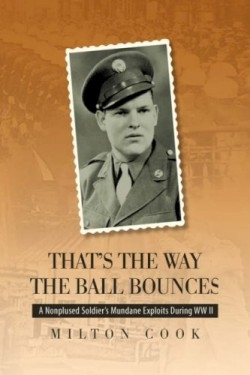That's the Way the Ball Bounces
A Nonplused Soldiers Mundane Exploits During WW II
The author, a World War II veteran who served as a member of the military police, is quite honest when he describes his day-to-day experiences as “mundane.” Milton Cook’s memoir reports on just about every little detail and duty, from his “greetings letter” from Uncle Sam in 1943 to his discharge two years later.
To be fair, a good proportion of servicemen and women had similar experiences; that is, they did not serve in combat, but as support personnel. “The circumstance that only about one third of those who served in the Armed Forces were directly involved in combat may be why, even among ourselves, we were disinclined to talk about our war experiences,” Cook writes—as if the lack of contact with the enemy diminishes the sacrifices these men and women made.
Among the author’s anecdotes are stories of training exercises, escorting prisoners from one unit to another, life around the barracks, and other minutiae, such as the exact size—length, width, and depth—of certain military publications and the various uniforms of the day.
The dialogue, although adequately recalled and reasonably reproduced, may be dull to those outside Cook’s family and friends. In fact, the book almost seems to be a diary, albeit it without the truly personal boasts, fears, and hopes that one would expect. In several chapters, Cook inexplicably narrates in the third person, writing, “Cook was in his room maintaining the shine on his shoes in preparation for this nights [sic] patrol duty.” The book is full of typos—Morris code for Morse code, for example—which would indicate a lack of editorial assistance; there are perhaps other errors that would be known only to those who served in the author’s outfit, the 1257th MP Company.
That said, Cook offers something that is rarely found in books about war in general: a look from the average serviceman’s point of view. There are no heroics here, no strategic insights, just an honest look at the humdrum. He even includes the types of photograph that thousands of G.I.s sent home to their loved ones, as a way of keeping in touch and letting them know they were safe.
Some of the most interesting stories deal with Cook’s return stateside, and the adjustment he had to make to civilian life Additional insights like this would have been more welcome than mere reportage of “mundane exploits.”
Disclosure: This article is not an endorsement, but a review. The publisher of this book provided free copies of the book and paid a small fee to have their book reviewed by a professional reviewer. Foreword Reviews and Clarion Reviews make no guarantee that the publisher will receive a positive review. Foreword Magazine, Inc. is disclosing this in accordance with the Federal Trade Commission’s 16 CFR, Part 255.

